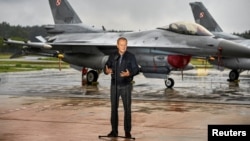France and Germany said they were helping to strengthen NATO ally Poland's air defense after at least 19 Russian drones entered Polish airspace on September 10, severely raising tensions between the Western military alliance and Moscow.
German government spokesman Stefan Kornelius on September 11 said Berlin's military would "extend and expand" air policing over Poland to provide additional cover for the country's airspace.
French President Emmanuel Macron said his country would "deploy three Rafale fighter jets to contribute to the protection of Polish airspace and of NATO's Eastern Flank together with our Allies."
"We will not yield to Russia’s growing intimidation," Macron added.
The office of British Prime Minister Keir Starmer said it "was clear Russia was continuing to ramp up its aggression, systematically stepping up its attacks through a campaign of increasingly belligerent actions."
Sweden, the Netherlands, and the Czech Republic all summoned the Russian ambassadors to their countries to protest the incident.
Later, US President Donald Trump told reporters he was "not happy" with the Russian drone situation but added that the incursion into Polish airspace "could have been a mistake," without elaborating.
A day earlier, Trump posted on his Truth Social platform: "What's with Russia violating Poland's airspace with drones? Here we go!" -- also without elaborating.
Since Russia's February 2022 invasion of Ukraine, concerns have risen in the West that Europe's largest ground war since World War II could spill over into neighboring countries, potentially igniting a direct confrontation between NATO and Russia.
Poland labeled the September 10 incident -- which led Polish and NATO forces to shoot down several of the approaching Russian drones -- a deliberate "unprecedented" attack on the country, NATO, and the European Union.
Polish President Karol Nawrocki on September 11 said it represented "an attempt to test the mechanism of action within NATO and our readiness to respond."
There were no casualties, although at least one house and a car were destroyed, officials said.
The Kremlin denied targeting Poland and said there was no evidence the drones were launched by Russia.
The UN Security Council called an emergency meeting for September 12 to discuss Warsaw's accusation that Moscow launched the drone raid on its territory.
It was not the first time that Russian drones and missiles have strayed into the airspace of NATO nations since the start of Russia's full-scale war on Ukraine. But this appeared to be a heavier influx of projectiles.
Poland bolstered security procedures on September 11, limiting air traffic along its eastern borders with Belarus and Ukraine until December 9.
Polish Prime Minister Donald Tusk called a NATO meeting on September 10, invoking NATO's Article 4, which is a mandatory convocation of members. It is the second time that has happened since February 2022, but it is short of the more serious Article 5.
NATO chief Mark Rutte called out Russia's "reckless behavior" and said the alliance's air defenses had done their job in intercepting at least some of the drones.
However, some in the West questioned the efficiency of the defense following reports that only four or five of the 19 drones had been shot down.
German Chancellor Friedrich Merz, who said he did not believe the violation of Polish airspace by Russian drones had been an accident, asserted that he saw the incident as "a very serious threat to peace throughout Europe."
Merz added that NATO's defenses did not work as well as they should have.
"This will trigger discussions in NATO. Of course, this will also trigger discussions in the European Union," Merz said.
"We are and will remain ready to defend ourselves and we are and will remain determined to significantly increase the defense readiness and defense capability of the European part of NATO," he added.













